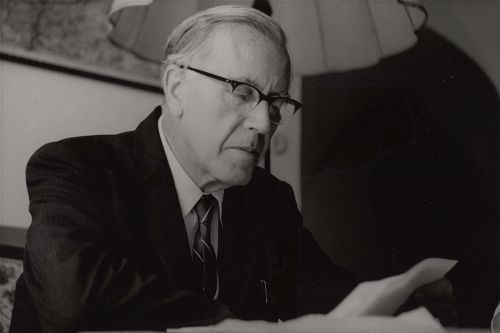Dietrich von Hildebrand first earned the hatred of the Nazi party in 1921. At a political convention in Paris, the Catholic philosopher declared Germany's 1914 invasion of neutral Belgium an “atrocious crime.” The divisive statement marked the first step in von Hildebrand's years-long battle against Nazism; a battle that inspired one German diplomat in 1937 to dub von Hildebrand “the greatest obstacle to National Socialism in Austria,” where von Hildebrand had launched a political journal. “There was something probably unintentionally profound and apt in that statement by this Nazi ambassador,” said John Henry Crosby, founder and director of the Hildebrand Project. “But, when he said that, he said something very true. The most profound opponent of Hitler were not his political enemies, they were his intellectual and spiritual foes.” “von Hildebrand, by devoting his full genius and intellectual power to dismantling National Socialism was, in some sense, a much more total enemy of National Socialism. It’s a tribute to the power of ideas.” Crosby is translator of von Hildebrand's recently published memoirs, titled “My Battle Against Hitler” (Image). The 352-page book is largely composed of von Hildebrand’s personal recollections during his fight with Nazism. “My Battle Against Hitler” offers a firsthand look into von Hildebrand's mind as he decides to flee his home in Germany in 1933. Readers also experience von Hildebrand’s pain as he sees Nazi persecution of his past colleagues and friends who questioned his decision to leave Germany. “Very, very few people in Germany in 1920-1921 already realized that Nazism was a poison,” von Hildebrand's wife, Alice, explained. “People closed their eyes and did not want to see. (Dietrich) saw the danger and he warned people. Many people would call him a pessimist, but unfortunately he was right.” Crosby said many Catholics in Germany attempted to make peace with Nazism, in the years before World War II. He explained that the Nazi party was likely very attractive in its beginning stages because it promised order and control after years of political violence in Germany. “It wasn’t maybe quite so completely surprising that (Nazism) would have gained a foothold in German life,” Crosby said. “But, on the other hand, it was clear that a lot of bad things were happening right from the beginning of the Hitler regime. He was a rabid race-hater and he was a terrible anti-Semite. So, there was every reason to be dubious about whether a Catholic could make peace.” And dubious von Hildebrand was. In his memoirs, von Hildebrand writes, “In the face of such dreadful movements and heresies as Bolshevism and Nazism, in which the Antichrist raises his head, every attempt to “understand,” every attempt at a certain neutral objectivity, is entirely impermissible.” Von Hildebrand's memoirs are filled with warnings of danger of becoming morally blunted. He constantly urges his colleagues and friends who stayed in Germany to remain morally alert and to avoid compromise. Crosby said von Hildebrand's sacrifices and uncompromising battle against Nazism serve as a powerful moral witness for modern-day Catholics. “I like to say that this book is like a field manual for moral witness,” Crosby explained. “I think the application here is really the question of when do we unwittingly make peace with evil? And particularly in our culture where there’s a lot of evil that’s masked under social acceptability.” “At the end of the day, it boils down to this idea of complicity,” Crosby said. “At what point does complicity with the culture become so great that I’ve tarnished my person? That I’ve lost my ability to live fully my Christian commitment.” Alice echoed Crosby's statements. “I believe intellectually, religiously and spiritually, we are facing a time of crisis,” Alice said. “There are a lot of dangers that are being spread in the younger generation, and you know what happened in Germany might happen in the United States.” “We have to realize that the hour is very great…and we need a voice who sees clearly what the teaching of the Church has been from the very beginning.” “My Battle Against Hitler” is now available for purchase online and in bookstores.

